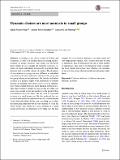Dynamic choices are most accurate in small groups
Author(s)
Vicente-Page, Julián; de Polavieja, Gonzalo G.; Perez Escudero, Alfonso
Download12080_2017_Article_349.pdf (3.909Mb)
PUBLISHER_CC
Publisher with Creative Commons License
Creative Commons Attribution
Terms of use
Metadata
Show full item recordAbstract
According to the classic results of Galton and Condorcet, as well as in modern decision-making models, accuracy in groups increases with group size. However, these studies do not consider the naturally occurring situation in which individuals dynamically re-evaluate their decision with a possible change of opinion. The dynamics of re-evaluation in groups are very different to individual re-evaluation because individuals influence the group and the group influences the individual. We find that individual accuracy in a group is higher when individuals re-evaluate because all members have more access to social information, while in single decisions, those deciding first have less. This improvement is smaller in large groups as in this case errors can cascade across the members of the group before re-evaluation can correct them. The net result is a maximal accuracy at a small group size. We also analyzed the case in which individuals are influenced only by a small number of the other individuals. In this case, cascading errors affect the interacting subgroups but are very unlikely to reach the whole group. This results in a local optimum at a small group size but also an optimum at a very large size. We thus suggest that re-evaluation dynamics can make small and very large groups optimal. Also, features that may be seen as limitations, like an influence from only a small number of individuals, may turn to be beneficial when considering local animal interactions, here filtering out cascading of errors in the group when reconsideration dynamics takes place. Keywords: Collective behavior, Collective decisions, Dynamic decisions
Date issued
2017-10Department
Massachusetts Institute of Technology. Department of PhysicsJournal
Theoretical Ecology
Publisher
Springer Netherlands
Citation
Vicente-Page, Julián, et al. “Dynamic Choices Are Most Accurate in Small Groups.” Theoretical Ecology, vol. 11, no. 1, Mar. 2018, pp. 71–81. © 2017 The Authors
Version: Final published version
ISSN
1874-1738
1874-1746